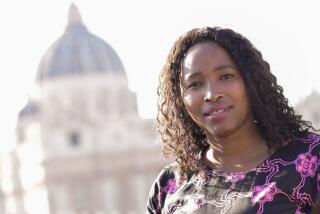Word ‘Lord’ Returned to Text of Gender-Inclusive Lectionary
- Share via
The third and final volume of a gender-inclusive lectionary, produced by a National Council of Churches committee for voluntary use in church services, has been published this month with one change--returning the word “Lord” to the main text.
In the effort to avoid exclusively masculine images for God and Christ, the previous two lectionaries used “Sovereign” for “Lord,” putting the latter word in footnotes.
Controversy arose two years ago when the committee announced its translation choices for the experimental lectionary. A lectionary is a selection of Bible readings used over a 3-year cycle, especially by churches with a formal liturgy.
Critics objected to such suggested substitutions as “God the Father and Mother” instead of “God the Father,” the “Realm of God” instead of “Kingdom of God” and the “Human One” for “Son of Man.”
Lectionary committee member Susan Brooks Thistlethwaite of Chicago Theological Seminary said the 11-member group changed its mind on the word “Lord” basically for two reasons. First, she said, feminists said “Lord” has lost its exclusively male identification, and second, black churches responding to committee questionnaires said a lot of inclusive language choices were possible but not a substitute for “Lord.”
“We have made a few changes not because of our critics but because of our friends,” Thistlethwaite said.
She will present a paper during a 2 1/2-hour panel discussion on the lectionary this afternoon at the Anaheim Hilton Hotel during the joint meeting of the American Academy of Religion and the Society of Biblical Literature.
Some members of the Sisters of St. Joseph of Carondlet are said to be upset over the scheduled appearance by Sister Judy Vaughn tonight on a panel during their Los Angeles provincial assembly. She is one of a group of sisters criticized by the Vatican for signing a newspaper ad last year that said that some Catholic theologians say abortion can be a moral choice in some instances.
The religious order, with 640 sisters in the province, is the largest body of nuns serving the Los Angeles Roman Catholic Archdiocese. Its 4-day provincial assembly at Carondlet Center near Mount St. Mary’s College ends Sunday.
Vaughn, like most other signers, has not retracted her action. She was told last January by the Catholic Social Services that that Los Angeles archdiocesan agency would not refer homeless women to a shelter operated by her.
Vaughn, who holds a doctorate in religious studies with a focus on social ethics, is on the panel with two other sisters, including Sister Miriam Therese Larkin, who has a doctorate in philosophy. Larkin is general superior of the order and was recently elected president of the nationwide Leadership Conference of Women Religious.
By participating in a panel discussion on abortion and other issues with the head of the religious order, critics have said that the selection implied a condoning of Vaughn’s position. Vaughn said she was indirectly aware of criticism within the community. She said, however, that the “respect life” theme covers more than just the abortion issue.
Sister Kathleen Mary McCarthy, who heads the Los Angeles province, asked to comment, said: “We are being respectful of church authorities and individuals involved. The study of Judy Vaughn’s case is not complete. Our stance is one of fidelity to the church and one of reconciliation.”
More to Read
Sign up for Essential California
The most important California stories and recommendations in your inbox every morning.
You may occasionally receive promotional content from the Los Angeles Times.













